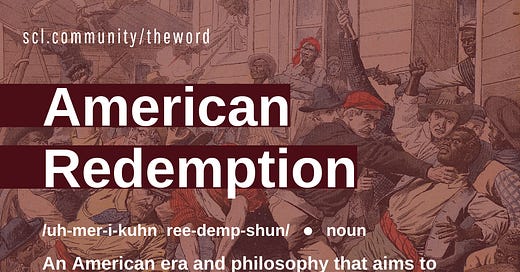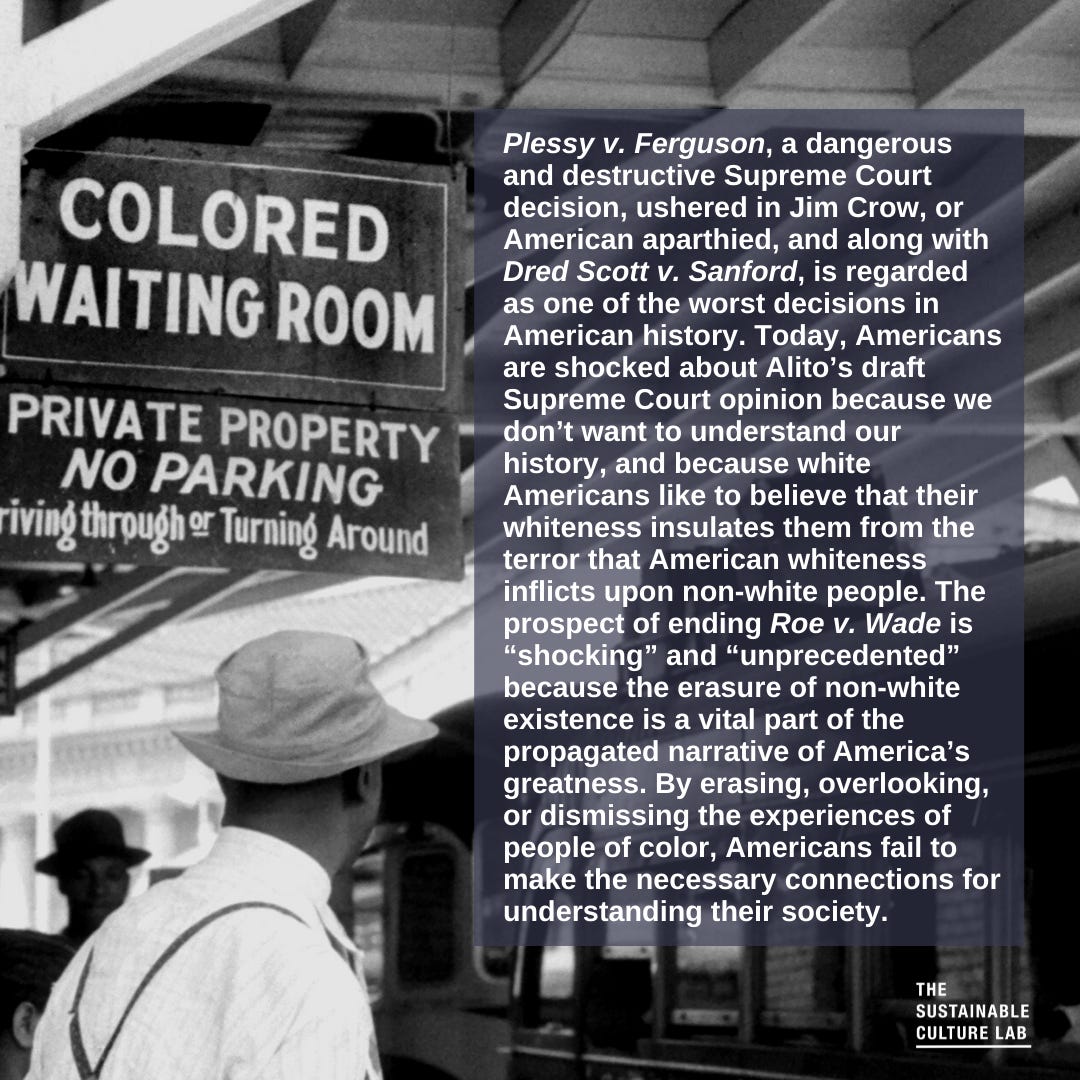American Redemption • noun • (uh-mer-i-kuhn ree-demp-shun)
Definition: An American era and philosophy that aims to return the United States to the norms of our Founding era; an example of our inverted, corrupted language
Origin: SCL
To help sustain and grow The Word with Barrett Holmes Pitner we have introduced a subscription option to the newsletter. Subscribers will allow us to continue producing The Word, and create exciting new content including podcasts and new newsletters.
Subscriptions start at $5 a month, and if you would like to give more you can sign up as a Founding Member and name your price.
We really enjoy bringing you The Word each week and we thank you for supporting our work.
My book THE CRIME WITHOUT A NAME was released on October 12, 2021 and NPR has picked it as one of the top books of the year!
You can order the book—including the audiobook—and watch recordings of my book tour discussions at Eaton and the New York Public Library at thecrimewithoutaname.com.
Following the leak of the Supreme Court’s draft opinion written by Samuel Alito that would overturn Roe v. Wade and Planned Parenthood v. Casey, I have been troubled by some of the language being used to express outrage.
Firstly, we all need to be outraged by this draft opinion. It would remove constitutional rights that Americans have had for nearly 50 years, and the logic articulated by Alito could place many other rights in jeopardy too: namely interracial and gay marriage. We all need to be outraged, but we should not be shocked. In fact, our shock shows how unaware we are of the society we live within. Our capacity to be perpetually shocked as the probable occurs demonstrates the severity of the problem.
Americans are shocked because our society aspires to articulate an ahistorical, propagated narrative of American history that expresses an inherent greatness of America because we believe that most Americans, and especially white Americans, will be unable to cope with the unpleasant authentic history of this society.
Additionally, our society’s comfort with the false narrative of American greatness also means that we find comfort in lies, especially lies articulated by white Americans. Lying about our society’s greatness makes Americans feel great, so we embrace the lie either consciously or subconsciously. This normalization of white lies means that even if we believe that the conservative justices lied during their confirmation hearings regarding their stance on Roe v. Wade, we are encouraged to believe that these lies could be beneficial and that they might not engage in the harmful actions that would be a logical extension of their originalist philosophy. We want to believe that the probable has become improbable as we empower the villains.
This is a complex corruption of language buttressed by the erasure of history, but surprisingly there is one American word that encapsulates this dystopian norm: redemption.
American Redemption is Regression and Oppression
In my book The Crime Without a Name: Ethnocide and the Erasure of Culture in America, I have a chapter dedicated to the horrors of American Redemption, which is one part of what I call the American Cycle. To learn more about the American Cycle listen to our four part podcast (parts 1, 2, 3, & 4).
The era of American Redemption occurred following the collapse of Reconstruction in 1877 as the South worked to “redeem” the South by bringing it back to the pre-Civil War status quo. Redemption in the American context is not a redemption from something bad to something good, or the atoning of a fault or a mistake. Redemption in America consists of believing that equality is a mistake and that we need to atone by returning, or regressing, to division and oppression. American redemption consists of destroying something that is good, so that we can return to something that is bad (which we linguistically articulate as being good or great).
Due to the Reconstruction Amendments to the Constitution, Southern states could not create explicitly racist laws so from the 1870s to the beginning of the 20th century, they formulated and implemented laws that were not explicitly racist but would have racist outcomes. Their language consisted of concealing their true agenda, so that they could obtain the power to pass laws that they knew many Americans were vehemently against.
One of the many ideas that these racist Southerners implemented to “redeem” the South was segregation. Since slavery had been abolished, the South had to develop a new system for separating white people from Black people and segregation became their new method. Black Southerners understood that segregation equated to a denial of the rights they had earned and created during Reconstruction, and that it was a violation of the equal protection clause of the Fourteenth Amendment. Black Americans strongly challenged these linguistically corrupt restrictions both in the courts and in the streets.
In 1892, Homer Plessy, a Black man, intentionally violated Louisiana’s Separate Car Act of 1890 that provided “equal, but separate” accommodations for Blacks and whites. Eventually, this case made it all the way to the Supreme Court and in Plessy v. Ferguson, the Supreme Court decided that “separate but equal” did not violate the Constitution.
The basis for their decision centered on the notion that equality did not equate the elimination of all “distinctions based on color,” and they gave great deference to the states to determine the health, safety, and morality of their state.
This decision attempted to say that Blacks and whites could theoretically be “equal” while also saying that Blacks interacting with whites could also be unhealthy, unsafe, and immoral. The logic used to justify this decision is ludicrous and on par with Chief Justice Roger Taney’s decision in Dred Scott v. Sanford that concluded that an enslaved person remained enslaved even when they had been taken to a “free” state because the Constitution entirely excluded Black people therefore Black people could never have constitutional protections or rights.
Plessy v. Ferguson, a dangerous and destructive decision, ushered in Jim Crow, or American aparthied, and along with Dred Scott v. Sanford, is regarded as one of the worst decisions in American history.
The philosophy behind Plessy and Dred Scott is the desire to “redeem” the South, and America, back to how it was at its inception, and this is the same logic that originalist jurists use to interpret the Constitution today.
After obtaining relative equality in the 1860s, Black Americans experienced the Supreme Court taking away those rights 30 years later. Black Americans who had experienced unprecedented freedoms were forced to raise their children under Jim Crow in social conditions not too dissimilar to those of their enslaved ancestors.
Alito’s draft opinion echoes Plessy and Dred Scott, and if it comes to fruition will get added to the growing list of abominable Supreme Court decisions that aspire to profess the ideals of America’s Founding Fathers.
Today, Americans are shocked about Alito’s draft Supreme Court opinion because we don’t want to understand our history, and because white Americans like to believe that their whiteness insulates them from the terror that American whiteness inflicts upon non-white people.
The end of Roe v. Wade is “shocking” and “unprecedented” because the erasure of non-white existence is a vital part of the propagated narrative of America’s greatness. By erasing, overlooking, or dismissing the experiences of people of color, Americans fail to make the necessary connections for understanding their society. The philosophy behind the redeemer methodology for ending racial equality in the 1890s is the same as the one being deployed in service of ending women’s rights in the 2020s.
Before and After Redemption
America’s Redemption dystopia paints a bleak picture of American society, and the bleakness grows even darker since thus far America has never figured out how to defeat Redemption.
With my theory of the American Cycle, Redemption is the fourth and final stage before the cycle repeats. Prior to the Redemption stage, the Cycle consists of the Founding, Abolition, and Reconstruction stages.
Founding is the founding of the United States where white Americans attempt to marry the perpetual division and oppression of ethnocide with the equality of democracy. America’s founding consisted of slaveholding states and free states, and the pro-slavery states were given a disproportionate role in controlling America’s democracy because of the wealth that slavery provided for the nation.
The Three-Fifths Compromise gave Southern slaveholders congressional representation and Electoral College delegates based on the amount of enslaved people in their states. Additionally, the fear that “free” states might dominate American democracy necessitated the creation of the senate so that states, and not people, could shape our democracy. By denying Black people freedom, white slaveowners were given the power to control America’s new democracy despite being the minority.
Eventually, the dystopian reality and hypocrisy of trying to sustain an ethnocidal democracy becomes clear, and the oppressed and their supporters rise up to abolish ethnocidal oppression. Following the success of the abolitionist movement, a new era of Reconstruction begins where America attempts to make a democracy absent of ethnocide.
Reconstruction outrages the ethnocidal South so the redeemers form terrorist militias and corrupt the law to suppress equality, and regain control of the government. Eventually, the unceasing terrorism and bad faith ends Reconstruction, and Redemption begins.
American Redemption ended upon the creation of a new, ethnocidal founding era called Jim Crow. American then had another abolition movement called the Civil Rights movement that sought to abolish Jim Crow. I theorize that America’s second Abolition continued until Barack Obama’s presidency, which was our second Reconstruction.
Donald Trump’s “Make America Great Again” slogan is the modern day iteration of redeeming the South, and his appointment of three Supreme Court justices played a vital role in continuing America’s second Redemption after his presidency ended.
Joe Biden’s presidency presents an opportunity to break the American Cycle, stop Redemption, and continue Reconstruction; but this is unchartered territory for America. Reconstruction only lasted 12 years, and Obama’s presidency was only eight years. At best, the United States has spent 20 years being proactively good, and transcending the dystopian ideals of our Founding Fathers. The vast majority of our history has been spent either celebrating awful ethnocidal ideals or trying to abolish these same ideals that America was celebrating a handful of decades ago.
America is very good at proclaiming that bad ideas are good ideas, and then trying to dismantle these ideas once some of us acknowledge that they are bad; but America has never been good at being proactively good and untethered from our ethnocidal roots.
What comes after American Redemption, historically, has never been good, so if we want to live in a good society we need to break the American Cycle.






